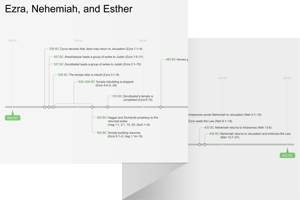10:1 before the house of God Refers to one of the outer courts of the temple.
10:2 Shecaniah Several other Shecaniahs are mentioned in Ezra and Nehemiah (see Ezra 8:3, 5; Neh 3:29; 6:18; 12:3), but it is difficult to identify this Shecaniah with any of them. Shecaniah was likely a person of some importance, probably among the leading men of the remnant (Ezra 9:1).
Elam The family of Elam returned to Jerusalem from Babylon with Zerubbabel and Jeshua (or Joshua; see 2:2, 7). Elam is also mentioned in 8:7 and 10:26, indicating it was likely one of the most significant families in the postexilic community.
have broken faith The Hebrew term used here is a technical term for violating an oath. It is often used in the context of a covenant. See note on 1 Chr 5:25.
10:3 send away all of these women and In the ancient Near East, mothers received custody of the children when they divorced (see Gen 21:14). The Jewish men were thus divorcing both their foreign wives and the offspring created by their union.
my lord In the Masoretic Text, the word for “lord” is adonai, which would refer to God, rather than adoni, which would translate “my lord” and refer to Ezra. While either option is possible, a reference to Ezra seems more appropriate to the context.
according to the law Refers to Deut 24:1–4, which provides procedures for divorce if a husband finds some indecency in his wife (Deut 24:1). Foreign wives were leading their Jewish husbands to worship their gods, hence the need for divorce. See note on Ezra 9:1–10:44.
10:6 the chamber of One of the many rooms of the temple complex (8:29). A building of storerooms and accommodations for those who worked in the temple was located adjacent to the temple.
Eliashib Possibly the same Eliashib who was high priest in the days of Nehemiah (see Neh 3:1, 20).
nor drink water At this point, Ezra has performed all the typical acts of mourning: torn his garments, pulled out his hair and beard, sat down, fallen on his knees, stretched out his hands, prayed, made confession, wept, prostrated himself, taken an oath, and fasted (see Ezra 9:3, 5; 10:1, 5, 6).
10:8 within three days Judah was a relatively small territory at this time. Jerusalem could easily be reached within three days from anywhere in the territory.
would be devoted to God The Hebrew word used here (charam or the related noun cherem) often had religious implications, referring to the destruction of people and things who would threaten Israel’s distinctiveness as a nation committed to Yahweh (Deut 7:2). However, the word was also used for things that were devoted to sacred use (Lev 27:21, 28–29; Ezek 44:29; Mic 4:13). Here the property of anyone who did not comply with Ezra’s ruling about intermarriage would become the official property of the temple (see the historical work of Josephus, Antiquities 11.148).
10:9 Judah and Benjamin A geographical notation, not a tribal indication.
ninth month Chislev (late November and early December) of 458 bc.
 Israelite Calendar Table
Israelite Calendar Table
the public square of the house of God Probably the only place in the city large enough to hold this gathering. A large portion of the city likely still lay in ruins (see Neh 1:3). The open square was also near the temple. Many of the Jews wished to offer sacrifices when confronted with their sin (Ezra 10:19).
10:15 stood against this These four individuals are probably not against the decision to divorce; they simply wished to resolve the matter as quickly as possible.
10:16 the first day of the tenth month December 29, 458 bc.
10:17 the first day of the first month March 27, 457 bc.
10:18–44 Assuming that the list is complete, a total of 113 Jews had married foreign women. Most of the names listed are theophoric, meaning they include a component representing the name of Yahweh. Nine of the 33 families from 2:3–35 are represented here. Two new families are added: a second Bani family (v. 34) and that of Binnui (v. 38). The roster includes 17 priests and 10 Levites, composing almost one-fourth of the total. |
10:18 Jeshua son of Jehozadak The family of the high priest is mentioned first.
10:44 foreign wives The foreign wives likely returned to the homes of their fathers, where they would then either remarry or live as widows (compare Ruth 1:8–9). See note on Ezra 9:2.

|
About Faithlife Study BibleFaithlife Study Bible (FSB) is your guide to the ancient world of the Old and New Testaments, with study notes and articles that draw from a wide range of academic research. FSB helps you learn how to think about interpretation methods and issues so that you can gain a deeper understanding of the text. |
| Copyright |
Copyright 2012 Logos Bible Software. |
| Support Info | fsb |
 Loading…
Loading…



